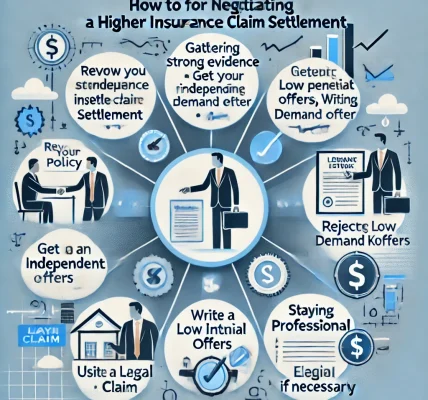Introduction
Filing an insurance claim is only the first step in recovering from a loss. The next critical phase is tracking the claim’s progress and ensuring it gets processed as quickly as possible. Many policyholders face delays due to missing documents, communication gaps, or procedural backlogs. In this DIY guide, we will walk you through how to check the status of your insurance claim and share actionable tips to speed up the process.
1. Understanding the Insurance Claim Process
Before diving into tracking and expediting, it’s crucial to understand the general insurance claim timeline:
Step-by-Step Claim Processing:
- Filing the Claim – You submit the claim along with required documentation.
- Claim Acknowledgment – The insurance company confirms receipt and assigns a claim number.
- Assessment & Investigation – The insurer reviews the claim, conducts inspections, and verifies policy coverage.
- Adjuster Evaluation – A claims adjuster examines damages and calculates compensation.
- Approval or Denial – The insurer either approves the claim with a settlement offer or denies it (with reasons provided).
- Settlement & Payment – If approved, the insurer processes the payment.
Understanding these stages helps you track progress and identify potential delays.
2. How to Check the Status of Your Insurance Claim
Method 1: Online Claim Tracking
Most major insurance providers offer an online portal or mobile app for real-time claim updates.
- Login to the insurer’s website/app using your policy details.
- Navigate to the “Claims” section.
- Enter your claim number to view the current status.
- Download or upload additional documents if needed.
Method 2: Calling the Insurance Company
If online tracking is unavailable or unclear, directly contacting your insurer can provide a clearer picture.
- Call the claims department (find the number on your policy or insurer’s website).
- Have your policy number & claim number ready.
- Ask for a status update and estimated processing timeline.
Method 3: Contacting Your Insurance Agent
If you worked with an agent to file your claim, they can act as an intermediary.
- Agents have direct access to claims adjusters.
- They can expedite requests or escalate delays.
Method 4: Checking via Email
Sending an email inquiry can provide a written record of your request.
- Use your insurer’s official customer service email.
- Include your name, policy number, claim number, and request for an update.
- Keep all responses for reference.
Method 5: Visiting a Local Branch
For major claims (e.g., property damage), visiting a local insurance office can help you connect with a claims representative directly.
3. How to Expedite Your Insurance Claim Processing
If your claim is stuck or delayed, follow these tips to speed up the process:
Tip 1: Submit Complete & Accurate Documentation
- Ensure all forms, receipts, photos, and reports are included.
- Double-check for missing signatures or errors.
Tip 2: Follow Up Regularly
- Set reminders to check in every 5–7 days.
- Frequent follow-ups show the insurer that you are actively engaged.
Tip 3: Escalate to a Supervisor
If your claim is taking longer than expected, request to speak with a claims supervisor or manager.
Tip 4: Involve a Public Adjuster
For large claims, hiring a licensed public adjuster can speed up negotiations and maximize your settlement.
Tip 5: File a Complaint if Necessary
If the insurer unreasonably delays processing, you can file a complaint with:
- State Insurance Regulatory Authority
- Better Business Bureau (BBB)
4. Why Insurance Claims Get Delayed & How to Avoid It
Common Reasons for Delays:
- Incomplete documentation – Missing receipts, police reports, or medical records.
- High claim volume – Natural disasters or widespread damages can slow processing times.
- Policy disputes – Coverage disagreements between you and the insurer.
- Investigation requirements – Complex cases may require additional assessment.
- Adjuster backlog – If too many claims are filed, it may take longer for an adjuster to review yours.
How to Avoid Delays:
✅ Keep records organized – Have a dedicated folder for all claim-related documents. ✅ File promptly – Report claims as soon as possible to avoid processing bottlenecks. ✅ Communicate clearly – Provide all details upfront to prevent unnecessary back-and-forth. ✅ Know your policy – Understanding exclusions and limits can help you avoid claim disputes.
5. Frequently Asked Questions (FAQs)
Q1: How long does it take to process an insurance claim?
It depends on the type of claim:
- Auto Insurance: 7–30 days
- Home Insurance: 30–90 days
- Health Insurance: 15–60 days
- Business Insurance: 60–180 days (depending on complexity)
Q2: Can I check my claim status without a claim number?
Yes, but it’s more difficult. Provide your policy number and personal details when contacting the insurer.
Q3: What should I do if my claim is denied?
- Request a detailed explanation from your insurer.
- Gather additional evidence and file an appeal.
- Seek legal or professional assistance if needed.
Q4: Can I negotiate my insurance settlement?
Yes. If the initial offer is too low, provide proof of higher repair costs or damages and negotiate with your insurer.
Q5: Will tracking my claim online speed up processing?
Tracking itself won’t speed up processing, but it allows you to identify delays and take action proactively.
Final Thoughts
Knowing how to check the status of your insurance claim and take proactive steps to expedite processing can save you time, frustration, and financial stress. By staying organized, following up regularly, and understanding your rights, you can ensure that your claim is processed efficiently and fairly.




